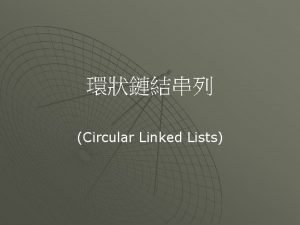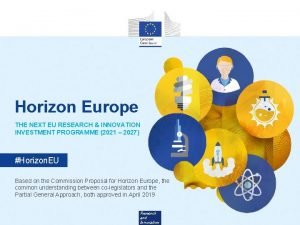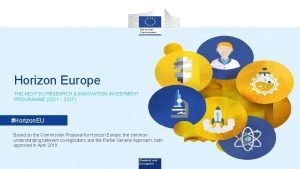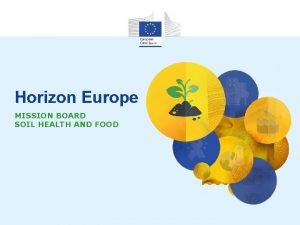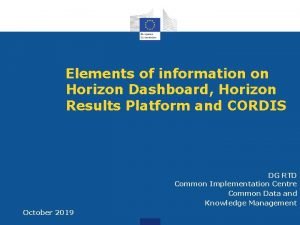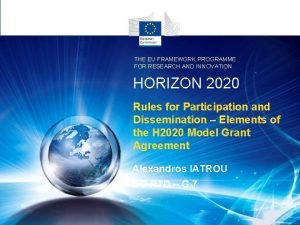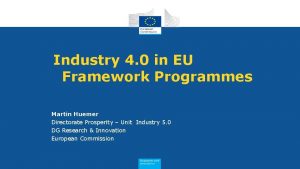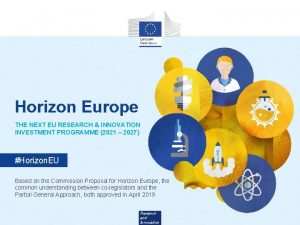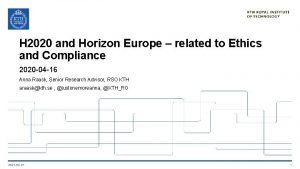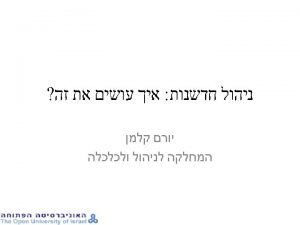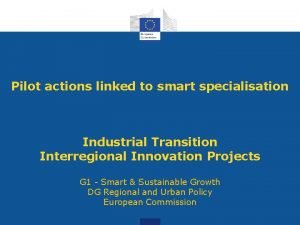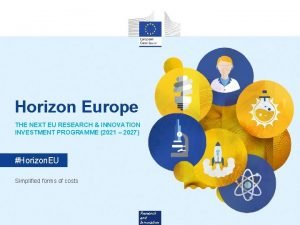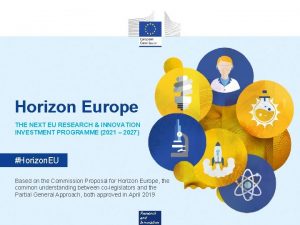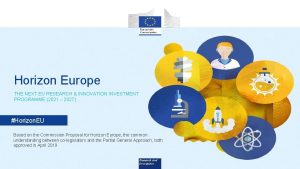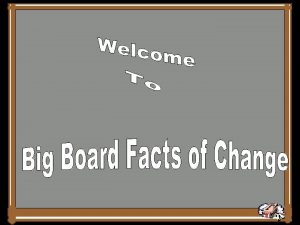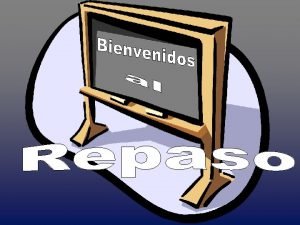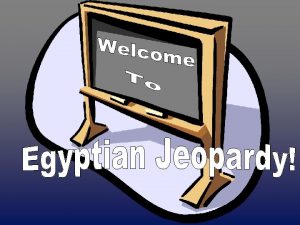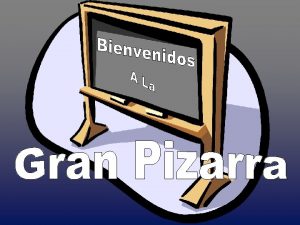Horizon Europe THE NEXT EU RESEARCH INNOVATION INVESTMENT













- Slides: 13

Horizon Europe THE NEXT EU RESEARCH & INNOVATION INVESTMENT PROGRAMME (2021 – 2027) #Horizon. EU Proposal submission and evaluation in Horizon Europe Building on experience and new challenges Research and Innovation

Evaluation process in H 2020 Solid and recognised process based on an evaluation made by external experts with a final decision taken by the Commission, fully and transparently justified. Feedback from experts in the 2017 exercise: 12046 evaluators of H 2020 calls were surveyed, 3600 answers were gathered.

Evaluation process in Horizon Europe Pending final decisions on Horizon Europe, there seems to be consensus on certain key points. For example: § Continuity: It is based on H 2020 evaluation process. Three evaluation criteria retained (Excellence, Impact, Quality of Implementation); Excellence only under the ERC. § Transparency: It remains a transparent approach, based on an evaluation made by external experts with a final decision taken by the Commission, fully and transparently justified. § Adapted to new features: Special arrangements possible, especially for missions and EIC (e. g. portfolio considerations when ranking; changes to proposals)

Draft orientations for Horizon Europe Areas where system can be improved based on lessonslearned, and how novel features can be accommodated: § Missions and EIC § Evaluation criteria (interpretation) § Evaluation modalities § Interaction with applicants § Proposal template

Missions and EIC Special arrangements will be needed for the parts of the Programme where it is important to establish a consistent portfolio of projects (esp. EIC, missions). For example: § The approach adopted will largely depend on the design of a mission call, and may need to vary from mission to mission; § Intrinsic quality of a proposal is determined first, and the portfolio considerations (spelled out clearly in the work programme) in a second phase; § Evaluation under the EIC is the subject of an ongoing pilot (EIC accelerator). It currently consists of a two-step process with a face-to -face interview at the second stage.

Evaluation criteria The draft Horizon Europe rules set the same three award criteria we have in H 2020: ‘Excellence’, ‘ Impact’ and ‘Quality and efficiency of the implementation’. These need to be spelled out, taking into account the lessons learnt: § Simplify and reduce the number of ‘aspects to be taken into account’, where possible, ensuring that the same aspect is not assessed twice; § Include an assessment of the quality of applicants under ‘implementation’, rather than as a separate binary assessment of operational capacity; § Simplify or remove assessment of management structures.

Evaluation modalities (i. e. : single-stage, two-stage and two -step procedures; scoring) Much experience but need better rationale for the use of one or other approach; and further simplification, where possible: § Reduce aspects evaluated at first stage; abolish ‘substantial change’ rule for second stage proposals (or at least define it with a very low bar); abolish first stage ESR for successful first stage applicants (while maintaining system of generalized feedback); § Examine implications of ‘blind’ evaluation at first stage (re draft legislation); § Review rules for ex-aequo (re draft legislation); § Examine possible re-calibration of the scoring system (with the same resolution), to increase the range above threshold.

Interaction with applicants Can increase the robustness and credibility of the system, but comes with a cost in terms of time and resources. Experience under H 2020 (ERC & EIC pilot), and in national programmes. § Interviews should form part of the process where appropriate, while ensuring equal treatment for all eligible competing applicants; § Other approaches? (e. g. written input? )

Proposal template There seems to be no need for drastic changes at this stage. But improvements to be identified. For example: § Where feasible, capture information needed to assess the quality of applicants in a structured form; § Reduce the maximum length of the proposal (e. g. 50 pages); § Structured vs non structured proposal. § Allow compatibility for more radical changes (e. g. videos? )

Other areas for attention include… § Resubmissions rules § Ethics review • Streamlined approach; focus of resources on problematic cases. § Security scrutiny • Implement a similar process as for ethics review based on a questionnaire in proposal § Redress (‘Evaluation review’) § Use of artificial intelligence (‘human-led AI’).

Results of consultation – Evaluation • • • A simple proposal template is the most important aspect for the submission and evaluation process, followed by a detailed feedback to unsuccessful applicants. A two stage procedure to reduce burden to applicants is the less important aspect Same trend for the 59 replies from Bulgarian and Romanian stakeholders, with also a strong interest on the fast time-to-grant.

Results of consultation – Evaluation Open questions: • ‘detailed feedback to unsuccessful proposals’ and ‘faster time-to-grant’ seem to be repeated in addition to the need to select good quality of experts. • For the evaluation of missions, the generalized message is: 'The quality and excellence of an individual proposal should never be compromised. ' • To run a pilot 'right to react' schema and to simplify the aspects to be considered under the three evaluation criteria are the most important proposed changes. • Similar trend for the 59 replies from Bulgarian and Romanian stakeholders together with also a strong interest for the pilot for blind evaluation

Thank you! May 2019 │ Version 25
 X.next = x.next.next
X.next = x.next.next Investment horizon
Investment horizon Horizon europe
Horizon europe Key impact pathways horizon europe
Key impact pathways horizon europe Soil health
Soil health Horizon europe
Horizon europe Horizon europe dashboard
Horizon europe dashboard Horizon europe mga
Horizon europe mga Horizon europe slides
Horizon europe slides Horizon europe slides
Horizon europe slides Horizon europe ethics
Horizon europe ethics Besigheidsplan
Besigheidsplan Incremental innovation vs disruptive innovation
Incremental innovation vs disruptive innovation Interregional innovation investment instrument
Interregional innovation investment instrument
